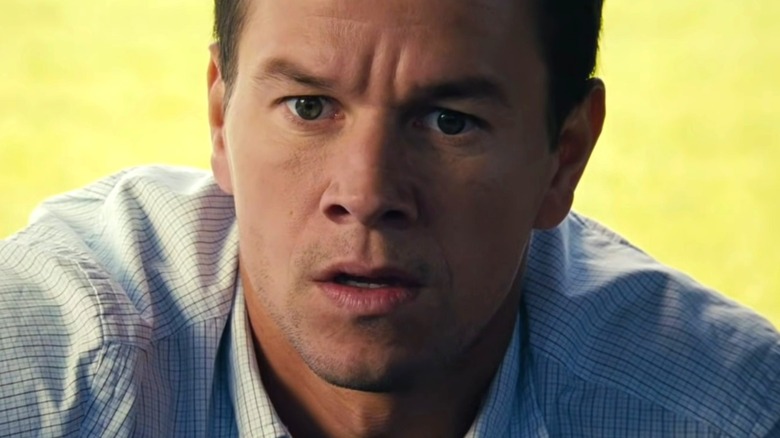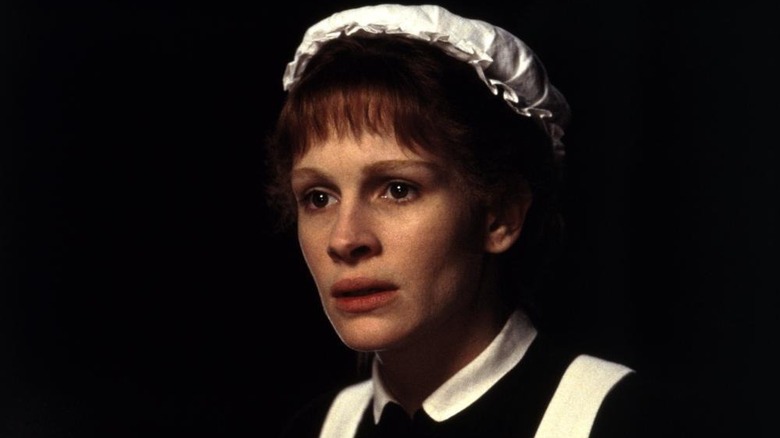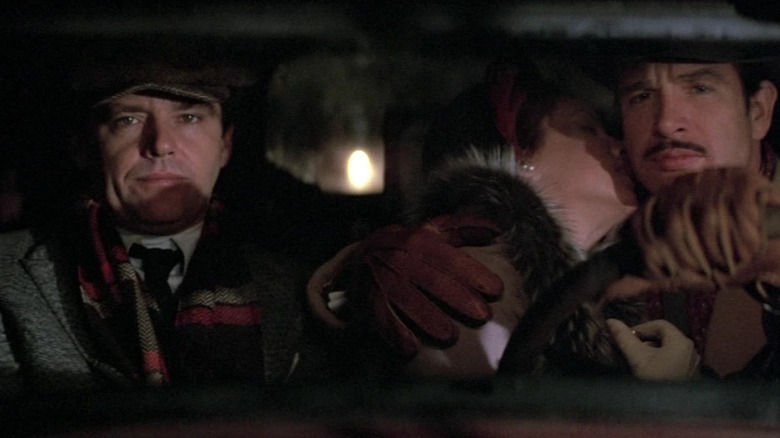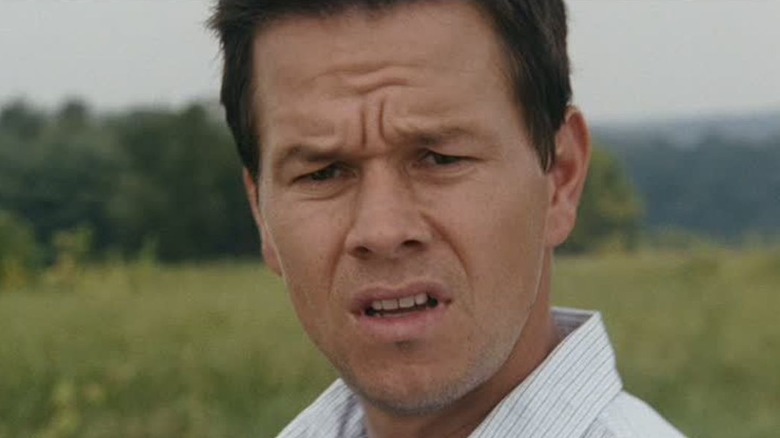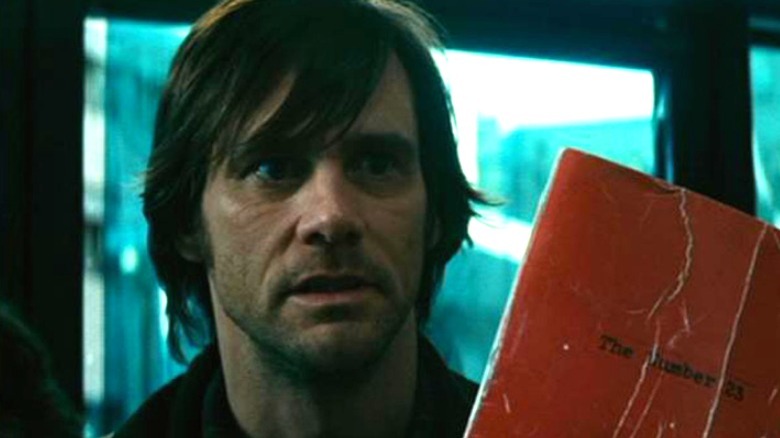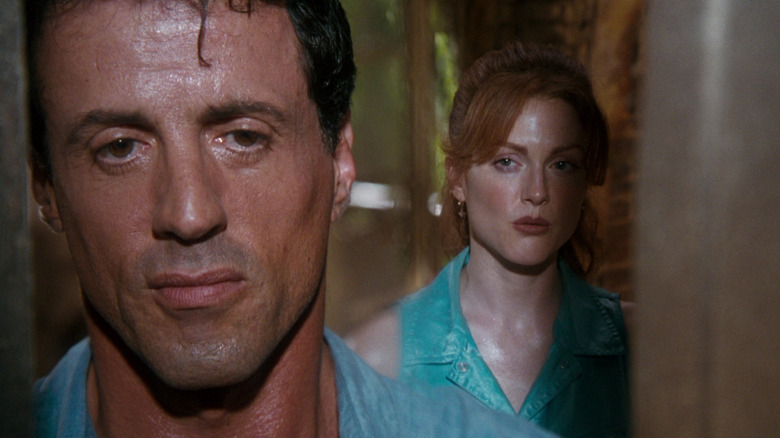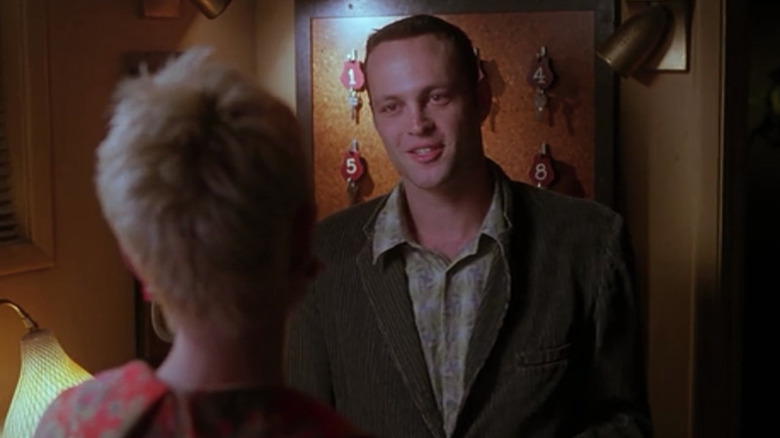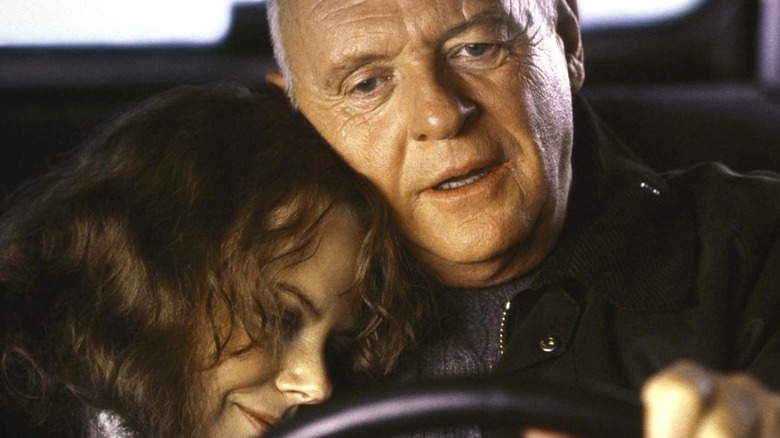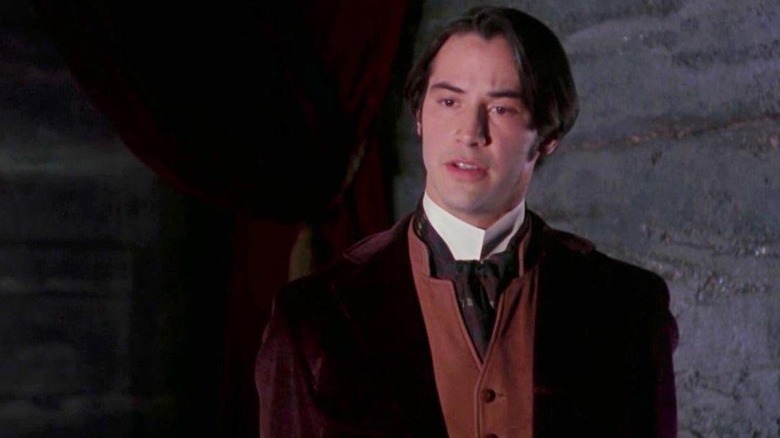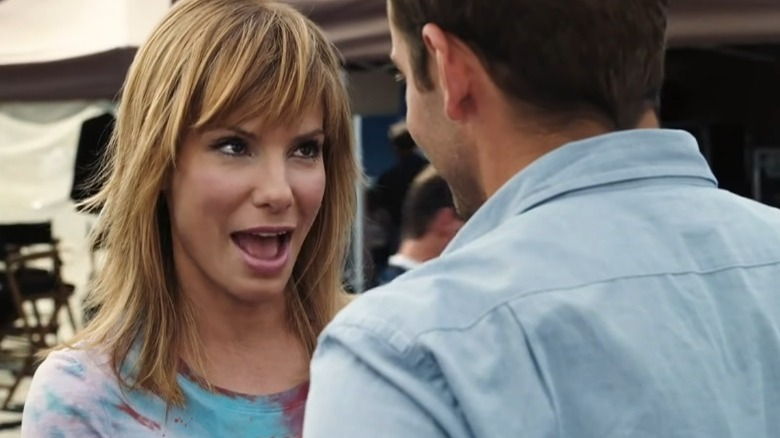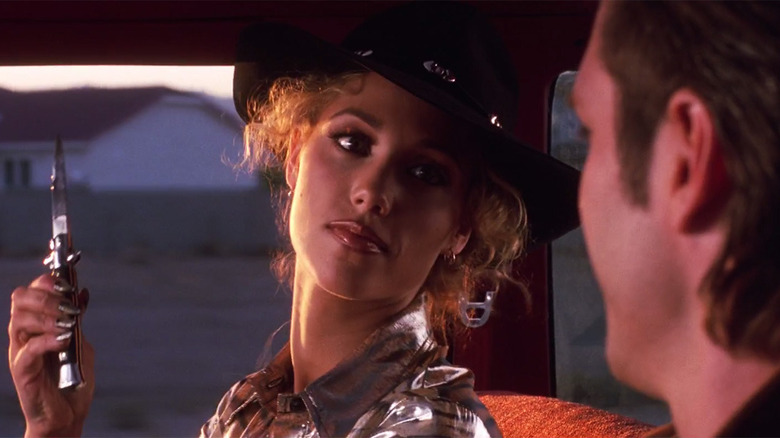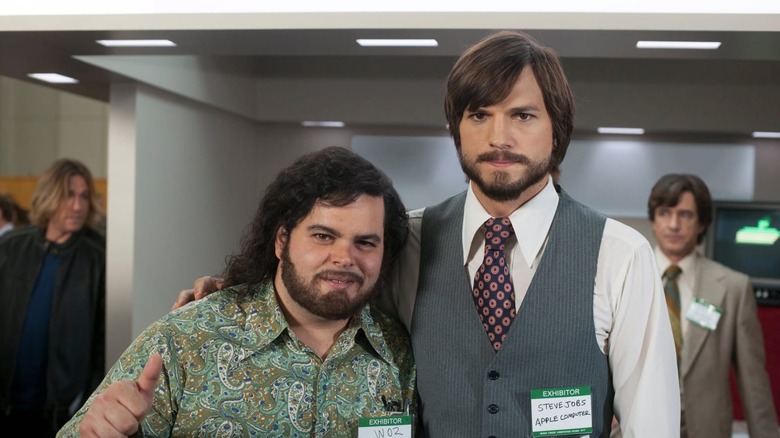Actors Who Failed Terribly In Against Type Parts
Typecasting is one of the worst traps an actor can fall into, as it often means that all studios want them to do is make carbon copies of what they've already done. Sometimes, the solution to this is for the actor to take a part completely outside of their normal type, revealing a previously unknown range. Actors like Brad Pitt and Matt Damon have made entire careers out of taking against-type roles, rebelling against everything Hollywood assumes they are. However, other actors have tried to stretch and realized that they've gone too far, that they've not only left their comfort zone but left behind everything that made people like them in the first place.
The actors below all tried admirably to escape the dominant personas that had been created for them, and their efforts were rewarded with failure and critical disdain. Many of these performances are outliers in otherwise successful careers — perhaps they scared the actors into not doing anything similar, teaching them that staying in their type isn't the worst thing that could happen to them.
Julia Roberts in Mary Reilly
Julia Roberts has been one of the biggest movie stars in the world for so long that it's easy to forget that her title was ever in jeopardy. But in the mid-'90s, she chose a string of movies and roles that didn't suit her, leading to a low period that lasted until the success of "My Best Friend's Wedding" in 1997. Her lowest point came with 1996's "Mary Reilly," where she starred as the Irish maid and love interest for John Malkovich's Dr. Jekyll and Mr. Hyde. Roberts hasn't taken a role this ill-fitting in any movie since.
The most obvious thing wrong with Roberts' "Mary Reilly" performance is her Irish accent, which is so cartoonish and unconvincing that it adds an unintentionally funny angle to what's trying to be a serious romantic horror movie. However, the rest of her performance comes off even sillier than her accent, as it is an at times laughable attempt to play a shrinking violet from someone who's much better off playing personable and charming. There's no hint of the magnetism that made Roberts a star in this performance, not when much of her screen time is spent whispering with her head slouched towards the floor.
Even if she were good, she'd be hard-pressed to have chemistry with Malkovich, who phones it in despite being cast to type as a distant, sometimes hostile authority figure. Together, they're a screen couple who only repel the viewer's attention.
Jack Nicholson and Warren Beatty in The Fortune
Mike Nichols' "The Fortune" is a movie that sounds great on paper, casting Jack Nicholson and Warren Beatty against their movie-star images as two dim-witted accomplices in a plot to marry an heiress and steal her fortune. Sadly, "The Fortune" was a waste of all its promising ingredients, reportedly going into production without a fully-written script and ending up as an almost laugh-free comedy. The film is full of problems, but Nicholson and Beatty still hold some of the blame for its creative failure.
Nicholson and Beatty unleashing their inner Three Stooges should be a good time, but neither one is up to the task. Nicholson is particularly out of his element. He hasn't often played buffoons and his only ideas of how to portray one are to make silly faces and remove any traces of the charm present in all his other performances. However, at least he occasionally gets a laugh, while Beatty is also ill at ease and completely unfunny to boot. Beatty has played fools throughout his career, but none like the pompous, wannabe-sophisticated one here, who Beatty plays so broad and theatrical that there's no mistaking the character for an actual human being.
When the central duo of a comedy is this unappealing, there's precious little amusement that can be taken from it.
Mark Wahlberg in The Happening
M. Night Shyamalan's "The Happening" developed a reputation as a legendarily so-bad-it's-good movie soon after its release, but it's better than that. It has plenty of the excellent thriller setpieces and offbeat humor of Shyamalan's better-received movies, it just struggles to balance the serious and silly sides as well as "Signs" or "Split" do. Nowhere is Shyamalan's struggle to integrate comedy into the horror more apparent than in Mark Wahlberg's lead performance, which plays like Shyamalan is making a joke at Wahlberg's expense.
Wahlberg's casting as a dorky science teacher is a world away from his usual roles as blue-collar action heroes. Later, when discussing "The Happening" with Entertainment Weekly, Wahlberg said he took the role because "at least [he] wasn't playing a cop or a crook." It's admirable that Wahlberg wanted to stretch himself, but here he seems completely lost without any of his crime-movie crutches.
It's not just that he's playing a character confused by the apocalyptic scenario around him, as Wahlberg himself looks confused by the things Shyamalan has him say and do, whether it's talking to his students about bees dying or making up elaborate lies about cough syrup to his wife. His bizarre performance ends up working for the movie in some ways, showing someone having an embarrassing breakdown in the face of the end of the world, but mostly Wahlberg is so goofy he undercuts both the tension and the attempts at a sincere emotional core.
Jim Carrey in The Number 23
Even when Jim Carrey makes something different than his usual broad comedies, he usually doesn't leave comedy behind altogether. "The Truman Show" and "Eternal Sunshine of the Spotless Mind" may be more serious-minded than "Dumb and Dumber," but they're still comedic enough to incorporate Carrey's goofy energy rather than neuter it or remove it entirely. His few entirely non-comedic movies have been critical and commercial bombs, but his attempt to lead a serious psychological thriller with 2007's "The Number 23" in particular may be his career low point.
"The Number 23" is an unsalvageable bad movie, with its ridiculous plot about a dogcatcher becoming obsessed with the number 23 being a long set-up for an even more absurd twist at the end. An actor better at playing intensity might have made it into serviceable trash for a little while. All Carrey does is tank it from minute one, not calibrating his manic personality to the rest of the movie's tone at all. As the dogcatcher, he doesn't have any jokes to say but still makes the same goofy faces he always does, turning what aspires to be a dark tale of psychosis into an "In Living Color" sketch.
Carrey's even worse as the imagined hero of the book driving the dogcatcher mad, affecting a monotone pout and playing a film noir detective like he's wearing a Halloween costume. He's funny in the part, but for all the wrong reasons.
Sylvester Stallone in Assassins
With the "Rocky" and "Rambo" franchises on ice for most of the 90s, Sylvester Stallone turned his attention to movies that tried to show different sides of him. The comedies Stallone made during this period, including "Stop! Or My Mom Will Shoot" and "Oscar," were all bombs, and so was 1995's "Assassins," his attempt to play a more intellectual, quiet action hero that blew up in his face.
In an interview with Empire (via Scraps from the Loft), "Assassins" director Richard Donner later praised Stallone for his underplaying, saying "he found the character and he went with it." However, Stallone's effort with the character behind-the-scenes didn't translate to the finished movie, where he just comes off as a bore. He spends much of "Assassins" blankly staring at computer screens, and when he has to deliver a big monologue, he does so with no feeling or intention, like he's reading his lines and nothing more. Stallone is a little more at ease during the movie's action scenes, but those dry up entirely by the third act, leaving Stallone with nothing to do but wait around for the plot to happen and start a boring romance with Julianne Moore's hacker character.
Stallone's deficiencies are especially obvious next to his costar Antonio Banderas, whose live-wire energy as the villain is the only thing that makes this movie enjoyable to watch at all. "Assassins" needed an actor who could hold his own against Banderas' onslaught, but all Stallone does is take up space.
Vince Vaughn in Psycho
After his breakthrough performance in "Swingers," but before his reign as one of the 2000s' biggest comedy stars, Vince Vaughn tried unsuccessfully to pivot away from comedy and into more dramatic roles. He struggled with one such part in "The Lost World: Jurassic Park," but that was nothing compared to how much he floundered playing Norman Bates in Gus Van Sant's shot-for-shot remake of "Psycho."
Vaughn makes for interesting Norman Bates casting in theory, trading Anthony Perkins' lanky physique and shyness for someone who's bulkier and more forward. He might have worked if he played the part completely differently than Perkins did, but he still tries to emulate Perkins' awkward demeanor and it doesn't work at all. In his early scenes before the original's famous switch in tone and perspective, Perkins came off as genuinely nervous and uncomfortable with basic conversation, making him seem harmless until he's not. Vaughn's impersonation of Perkins' laugh and stumbling speech, meanwhile, is so labored and unconvincing that he's an obvious red flag, telegraphing Norman's sinister side immediately and clumsily. Perkins is such a specific performer that doing an impression is difficult, but Vaughn botches it worse than most would.
Vaughn's weak performance ends up doing favors for his screen partners, who are already good and only look even better next to Vaughn. Norman Bates becomes the least interesting character in the "Psycho" remake, a radical change for what aspires to be a direct recreation of the original.
Anthony Hopkins and Nicole Kidman in The Human Stain
Sometimes, against-type casting is so obviously misguided that it becomes the only thing in the movie people can talk about. This is what happened with both leads of the 2003 Philip Roth adaptation "The Human Stain," two Oscar winners playing roles they are plainly unsuited for. Even the most positive reviews "The Human Stain" received came with the asterisk that Anthony Hopkins shouldn't be playing a light-skinned Black academic and Nicole Kidman shouldn't be playing a low-status janitor.
Hopkins and Kidman are both actors who rarely give bad performances, but their commitment means nothing when neither can overcome the cluelessness of their casting. Hopkins does as well in his part as he possibly can, but there's no compensating for him being fundamentally unacceptable in the part. Kidman fares even worse because she's at the mercy of all the production and costume department's decisions made to de-glamorize her, none of which work. They just make her look like an elegant movie star wearing the costume of someone living below the poverty line, making the casting even more insulting.
Tom Hanks in The Bonfire of the Vanities
A lot went wrong behind the scenes of the adaptation of Tom Wolfe's "The Bonfire of the Vanities," enough to spawn both a book and a podcast about the torturous production (via The New York Times). However, when "The Bonfire of the Vanities" finally made it to theaters in 1990, nothing sank it more than the performances of its three leads. Bruce Willis and Melanie Griffith got their share of bad reviews for it, but the most vicious criticism was reserved for Tom Hanks, who's never been more egregiously miscast since.
Tom Hanks has gone on to play a handful of villainous roles, such as his recent role in "Elvis," but in 1990 he was synonymous with "Big" and his image as Hollywood's nicest guy. This made him a bizarre choice to play the main character of "The Bonfire of the Vanities," a loathsome Wall Street yuppie whose life unravels after being behind the wheel of a hit-and-run. Rather than admit Hanks was miscast for the part and go to someone else, the makers of "The Bonfire of the Vanities" instead tried to soften the character to make Hanks a more natural fit for it.
The end result satisfied no one, the satirical bite of the original novel got lost in the rewrites and Hanks still gave a bad performance in the part. At this point in his career, he was too soft a presence even for the watered-down version of this character, as his boyish energy is all wrong for someone who needs to be played as a hardened adult.
Keanu Reeves in Bram Stoker's Dracula
Keanu Reeves is a great actor, but casting him in the wrong part can make him look like an amateur. He's rarely taken a part more wrong for him than the one in Francis Ford Coppola's movie film "Bram Stoker's Dracula," where he plays an ordinary British gentleman thrust into gothic horror.
Coppola told The New York Times before the release of "Dracula" that he cast Reeves because he needed "some kind of matinee idol" to liven up the part of Jonathan Harker, "because it isn't such a great part." It isn't a great part but Reeves couldn't find a way to make it any better, adopting a distracting English accent and otherwise just playing Jonathan even more boring than he is on the page. Next to the hammy performances of his costars and the opulent sets and costumes surrounding him, he comes off as wooden and not worth paying attention to.
Coppola would later admit that he did Reeves a disservice by making him attempt an English accent, explaining to Entertainment Weekly that Reeves worked so hard to get the accent right that "it came off as stilted." His efforts to try something different are admirable, but they only led him to fall on his face.
Sandra Bullock in All About Steve
Within one weekend in March 2010, Sandra Bullock won both an Oscar and a Razzie. The Oscar was for "The Blind Side," a tough-as-nails star performance, and the Razzie was for "All About Steve," the most desperate she's ever looked on-screen.
It seems on the surface that there's no reason why "All About Steve" should be such a mismatch for Bullock, as she's made a living off romantic comedies for decades and here has the benefit of Bradley Cooper as her screen partner. However, watching it reveals just how antithetical it is to the buttoned-up but charming performances Bullock has given in many rom-coms. Bullock flounders in a movie as aggressively silly as "All About Steve," all that's visible is the large amount of effort she's putting into each joke to no avail. Bullock is fully committed to her frenzied performance, but the effect is like nails on a chalkboard and is ultimately so irritating she makes the viewer forget they ever liked her in the first place.
"All About Steve" is a disaster with or without Bullock, unfunny and built around a character whose over-the-top cluelessness makes her more a hateful caricature than a human being. Still, it would likely be forgotten without such a high-profile movie star embarrassing herself at the center, which makes it into a warning that broad comedy can be difficult to play even for professionals.
Elizabeth Berkley in Showgirls
Paul Verhoeven's "Showgirls" has developed a massive cult following since it was a widely-mocked bomb at the time of its release, even winning support from critics and respected directors (via Cinema Blend). However, no amount of reappraisal can fix the damage it did to star Elizabeth Berkley's career, destroying any chance of a film career on her first attempt to build one.
Berkley came to "Showgirls" from "Saved by the Bell," the kid-friendly sitcom whose cast all struggled to find lasting careers beyond the show. Mario Lopez and Mark-Paul Gosselaar found some success by staying on TV, but Berkley tried to break into movies with a complete 180 from her squeaky-clean image by appearing in an NC-17-rated drama about the seedy underbelly of Las Vegas. The amount of sex and debauchery in "Showgirls" would've turned off people who associated Berkley with "Saved by the Bell" on its own, but that was compounded by Berkley giving a bizarre, unhinged performance.
"Showgirls" is never a subtle movie but most of its actors try to take it at least a little seriously, while Berkley sprints into every scene with an exhausting amount of energy. It's the kind of wide-eyed, loud performance one would expect from the star of a kids' sitcom show, and it's a testament to Verhoeven's direction that he makes it work within the movie's universe. However, critics didn't even see that much merit in her "Showgirls" performance, prematurely ending her chances as a leading lady.
Ashton Kutcher in Jobs
Ashton Kutcher has mostly avoided dramatic roles, sticking to the comedies that have defined him since his breakout on "That '70s Show." His serious turn in 2004's "The Butterfly Effect" has its fans, but his performance as legendary Apple founder Steve Jobs in the 2013 biopic "Jobs" proves he was better off sticking to what people liked about him.
Even for an experienced dramatic actor, the task of playing Steve Jobs is a challenging one. Portraying him requires finding a balance between the overwhelming charisma that made people worship and want to work under Jobs alongside the tremendous ego that alienated so many of his friends and family members. Kutcher has played jerks before, and thus he does alright with Jobs' more prickly qualities. Sadly, he can't deliver on Jobs' intelligence or his tremendous public speaking abilities, which flattens Jobs out to someone who's all difficulty with no real humanity.
There's no reason for people to want to follow Kutcher's Jobs besides that fact this is what they did in real life. Michael Fassbender would take on the character in "Steve Jobs" two years after Kutcher and make Kutcher's performance and the movie around it irrelevant, as Fassbender can navigate the many facets of Jobs' personality with wit and emotion while all Kutcher does is look stern.
